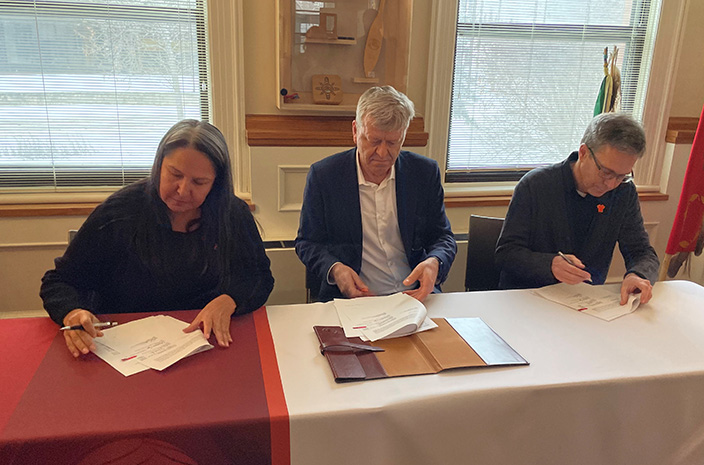NCTR and Missionary Oblates of Mary Immaculate Sign Supplemental Agreement for Strengthened Collaboration on Residential School Records

TREATY 1 TERRITORY, WINNIPEG, December 3, 2024 – The National Centre for Truth and Reconciliation (NCTR) and the Oblates of OMI Lacombe Canada (the Oblates) have signed a supplemental agreement to accelerate access to personnel files of Oblate members who worked in residential schools in Canada. This agreement to share records, information, and documents not previously provided to the Truth and Reconciliation Commission of Canada (TRC) or to the NCTR is part of an ongoing commitment to supporting Survivors, their families, communities and researchers.
In support of the NCTR’s role as the primary custodian for Indian Residential School records and its mandate from the TRC’s Calls to Action, this agreement will further enhance the transparency and availability of critical historical Oblate documents by facilitating access to previously restricted files.
Through ongoing dialogue to secure additional documents, this agreement will further ensure that the personnel files of Oblate members who have been deceased for at least two years are available for research. Previously, personnel records were sealed until 50 years after a member’s passing. This specific commitment follows comments from the NCTR that access to the personnel files of Oblates who worked in residential schools are needed and can help researchers develop a more thorough understanding of this chapter in history on behalf of Survivors.
Through this agreement, the Oblates and the NCTR will ensure that personnel records, documents and information are available to the fullest extent that federal and provincial privacy laws allow. For the next year, to help support these efforts, the Oblates will fund an archivist position at the NCTR to oversee the transfer of Oblate records, conduct historical research on the Oblates’ involvement in residential schools, and ensure the accurate documentation and accessibility of these records.
This agreement represents the culmination of years of work between the NCTR and the Oblates and represents a significant step forward in our relationship and on our shared path to truth,
said Stephanie Scott, Executive Director of the NCTR. We are deeply grateful to the Survivors and Elders who guided us through this process, although the conversations were not always easy as we moved the work forward. We know that additional residential school records will provide more information to help further reveal the truth. This agreement will support transparency and access to critical historical documents, including previously restricted files — the significance of this cannot be overstated.
;
The Oblates of Mary Immaculate are grateful for the partnership and collaboration of the National Centre for Truth and Reconciliation, as we work to ensure that residential school survivors, their families, and their communities have transparent access to information,
said Fr. Ken Thorson, Provincial of OMI Lacombe Canada. We believe this agreement represents a meaningful step forward, while recognizing that significant work lies ahead. We will continue to approach this work with humility and a willingness to learn through engagement, dialogue, and meaningful conversations.
This agreement is part of ongoing efforts between the two organizations to strengthen collaboration and expedite access to critical residential school records. This includes working closely with the archives that own or hold Oblate collections related to residential schools, while also providing direct support to Survivors, their families, and Indigenous communities in their search for truth. Through this continued collaboration, the NCTR and the Oblates aim to ensure that essential documents are available to all who seek them.
As part of these efforts to date:
- Personnel files of hundreds of Oblates who worked in residential schools have been reviewed and prepared for access with the remaining work to be completed under the agreement.
- 80% of all handwritten journals from Oblate missionaries (known as Codex Historicus) have been digitized, inventoried and transmitted to the NCTR, with the Oblates providing funding for archivists to gather and digitize these records.
- The NCTR completed a review of the Oblate administrative archives in Rome and published a report of its findings online. The report includes a recommendation to review and digitize approximately 1,500 historical photographs of Oblate-operated residential schools in Canada. The NCTR continues to work with the Oblates to create high-quality reproductions of photos housed in the Oblate archives to send to the NCTR for use by researchers.
- The Oblate personnel files will contribute greatly to the understanding of the history and legacy of the residential school system.
About the NCTR
The NCTR, created by the Indian Residential School Settlement Agreement, is an Indigenous-led national centre dedicated to preserving records related to the history and legacy of Canada’s residential school system. It holds the records from the TRC and other relevant documents, guided by Indigenous protocols and values. It is the responsibility of the NCTR to steward and share the truths of Survivors’ experiences in a respectful way and to work with Indigenous and non‐Indigenous educators, researchers, communities, decision‐makers and the general public to support the ongoing work of truth, reconciliation, and healing across Canada and beyond.
About the Missionary Oblates of Mary Immaculate
The Missionary Oblates of Mary Immaculate were founded in 1816 by St. Eugene de Mazenod in Aix-en Provence, France. The community arrived in Canada in 1841. After their arrival, Oblate priests and brothers worked across Canada and throughout the far north in a variety of areas, including residential schools, parish and retreat ministry, and hospital and prison chaplaincies. OMI Lacombe Canada Province is based in Ottawa, ON.
Media Contacts:
- OMI Lacombe Canada: information@omilacombe.ca
- National Centre for Truth and Reconciliation: nctr-communications@umanitoba.ca
